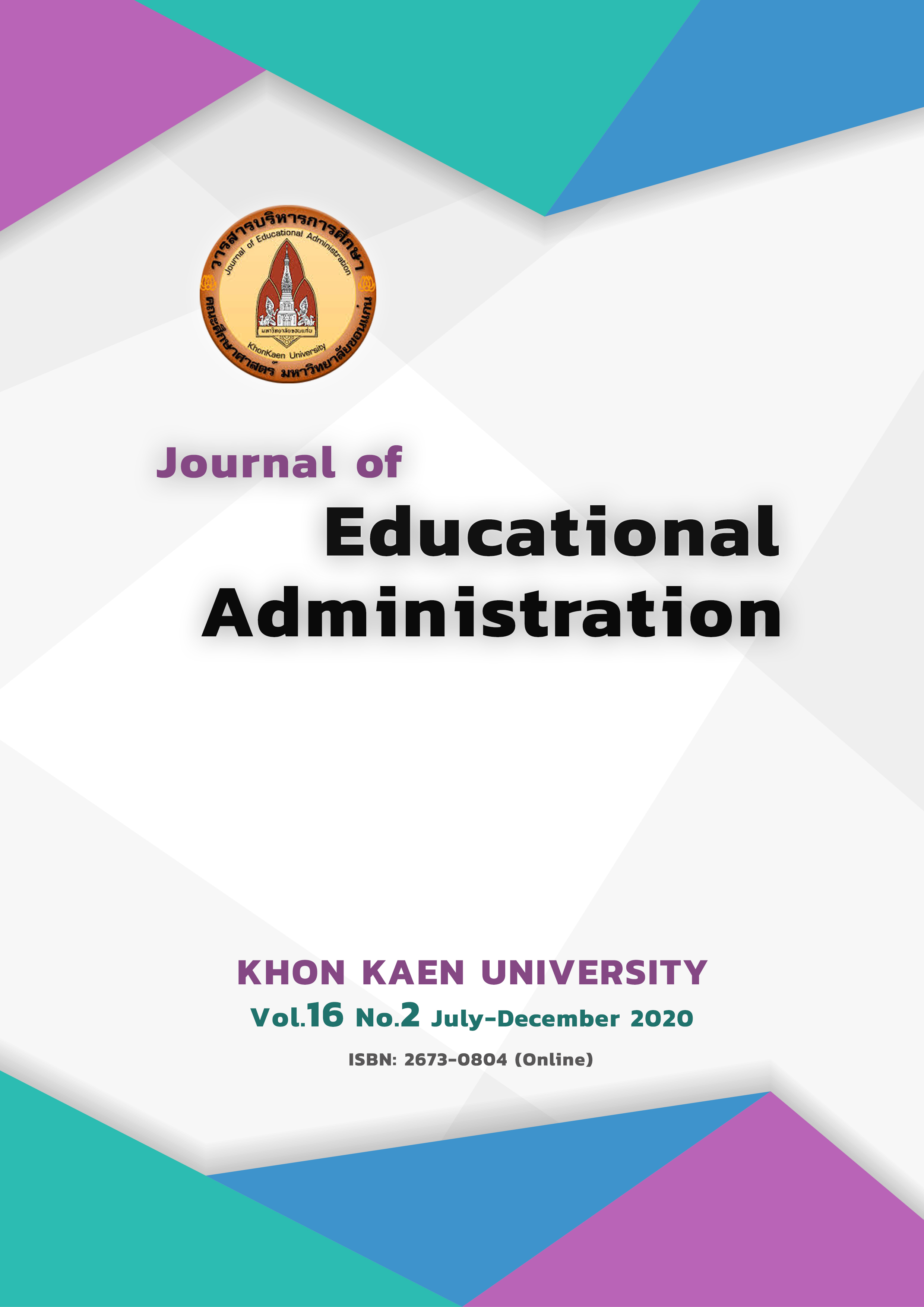THE THE NEEDS ASSESSMENT OF SCHOOL MANAGEMENT BASED ON THE CONCEPT OF SCHOOL AS LEARNING COMMUNITY OF CHANPRADITTHARAM WITTAYAKOM SCHOOL
Main Article Content
Abstract
The purpose of this research was to assess the priority need in school management based on the concept of school as learning community Chanpradittharam Wittayakom School. This study was a descriptive research of Chanpradittharam Wittayakom School and the informants consisted of 75 people, including 5 administrators and 70 teachers. By using the tables of Krejcie and Morgan at 95% confidence level in the sampling. The research instrument was a rating scaled questionnaire. The data was analyzed by frequency distribution, percentage, mean, standard deviation and PNImodified.
The findings showed that the overall present state and desirable state in school management based on the concept of school as learning community Chanpradittharam Wittayakom School were at a medium level (x ̅= 3.44) and a high level (x ̅ = 4.32), The first priority was implementation (PNImodified = 0.332), followed by planning school management (PNImodified = 0.231) and evaluation (PNImodified = 0.211). The priority need in school management based on the concept of school as learning community. The first priority was philosophy of as learning community (PNImodified = 0.290), followed by activity system of as learning community (PNImodified = 0.254) and vision of as learning community (PNImodified = 0.225). The school can use the research result to plan the school's management approaches that promote the school as a learning community.
Article Details
References
จิตรแก้ว พงษ์ไชย. (2562). กรอบแนวคิดกระบวนการพัฒนาชุมชนแห่งการเรียนรู้ทางวิชาชีพด้านสะเต็มศึกษา.
วารสารอิเล็กทรอนิกส์ทางการศึกษา, 14(2), 1.
ซาโต มานาบุ. (2559). การปฏิรูปโรงเรียน แนวความคิด “ชุมชนแห่งการเรียนรู้” กับการนำทฤษฎีมาปฏิบัติจริง.
นนทบุรี: โรงพิมพ์ภาพพิมพ์.
นิภาพร กุลสมบูรณ์. (2562). โรงเรียนพุทธจักรวิทยา: ชุมชนการเรียนรู้นำร่อง เพื่อประสิทธิภาพของ นักเรียนและครู. ค้นเมื่อ 10 พฤศจิกายน 2562, จาก https://adaybulletin.com.
พิมพันธ์ เดชะคุปต์และพเยาว์ ยินดีสุข. (2560). ทักษะ 7C ของครู 4.0. กรุงเทพฯ: สํานักพิมพ์แห่งจุฬาลงกรณ์มหาวิทยาลัย.
พรจรรย์ พัชรมณี, สมบัติ นพรัก. (2558). รูปแบการบริหารจัดการระบบคุณภาพในโรงเรียนมาตรฐานสากล สังกัด
สำนักงานเขตพื้นการศึกษาประถมศึกษา. วารสารมนุษย์ศาสตร์และสังคมศาสตร์ มหาวิทยาลัยพะเยา,
(3), 33-45.
มินตรา ลานสนิทเสรีกุล. (2561). กลยุทธ์การบริหารโรงเรียนมัธยมศึกษาตามแนวคิดชุมชนแห่งการ เรียนรู้ทางวิชาชีพ ความไว้วางใจของคณะครู และคุณภาพของผลลัฑธ์ทางการศึกษา. วิทยานิพนธ์ปริญญาครุศาสตรดุษฎีบัณฑิต. คณะครุศาสตร์. จุฬาลงกรณ์มหาวิทยาลัย.
เมธาสิทธิ์ ธัญรัตนศรีสกุล. (2560). ชุมชนแห่งการเรียนรู้ทางวิชาชีพ: แนวทางการปฏฺบัติสำหรับครู.
วารสารวิจัย มหาวิทยาลัยเทคโนโลยีราชมงคล มนุษศาสตร์และสังคมศาสตร์, 2(2), 214-228.
รัตนา จันทร์รวม. (2560). นวัตกรรมการบริหารโรงเรียนระบบทวิศึกษาตามแนวคิดหลักสูตรการศึกษา
เชื่อมโยงสู่อาชีพ. วิทยานิพนธ์ปริญญาครุศาสตรดุษฎีบัณฑิต. คณะครุศาสตร์. จุฬาลงกรณ์มหาวิทยาลัย.
โรงเรียนจันทร์ประดิษฐารามวิทยาคม. (2561). รายงานผลการประเมินตนเองของสถานศึกษา
ปีการศึกษา 2561. กรุงเทพมหานคร.
วีรภัทร รุ่งโรจน์นภาดล. (2558). แนวทางการบริหารการจัดการเรียนการสอนภาษาไทยให้แก่เด็กต่างในโรงเรียน
ต้นแบบคนพลัดถิ่น สังกัดสำนักงานเขตพื้นที่การศึกษาประถมศึกษาสมุทรสาคร จังหวัดสมุทรสาคร.
วารสารอิเล็กทรอนิกส์ทางการศึกษา. 10(3). 199-209.
สุวิมล ว่องวาณิช. (2558). การวิจัยประเมินความต้องการจำเป็น. กรุงเทพฯ: สำนักพิมพ์แห่ง จุฬาลงกรณ์มหาวิทยาลัย.
แสงสุรีย์ ดวงคำน้อย. (2561). การเรียนรู้เชิงรุก: กิจกรรมท้าทายความสามารถสำหรับผู้เรียนในยุคการศึกษา 4.0.
วารสารวิชาการและวิจัย มหาวิทยาลัยภาคตะวันออกเฉียงเหนือ, 8(3). 61-71.
สํานักงานเลขาธิการสภาการศึกษา. (2560). แผนการศึกษาแห่งชาติ พ.ศ.2560-2579. กรุงเทพฯ: พริกหวานกราฟฟิก.
Apple Inc. (2011). Challenge based learning: Take action and make a difference. U.S.A.: Apple Inc.
Duch, B. J. (1996). Problem-Based Learning in Physics: The Power of Students Teaching Students. Journal of College Science Teaching, 15(5), 326-29.
DuFour, R. (2004). What is a "professional learning community"?. Educational leadership, 61(8), 6-11.
Hord, S. M. (2009). Professional learning communities. Journal of Staff Development, 30(1), 40-43.
Hord, S. M., & Hirsh, S. (2008). Making the promise a reality. Sustaining professional learning communities,
-40.
Krejcie, R.V., & Morgan, D.W., (1970). Determining Sample Size for Research Activities. Educational and
Psychological Measurement.
Newby, T.J., Stepich, D. A., James. D., & Rusell, J. D. (2000). Instruction technology for teaching learning
(2nd ed.). Upper Saddle River, NJ: Merrill.
Newmann, F. M., & Wehlage, G. G. (1995). Successful school restructuring: A report to the public and
educators.
Phillips, J. (2003). Powerful learning: Creating learning communities in urban school reform. Journal of
curriculum and Supervision, 18(3), 240-258.
Strahan, D. (2003). Promoting a collaborative professional culture in three elementary schools that have beaten
the odds. The Elementary School Journal, 127-146.


